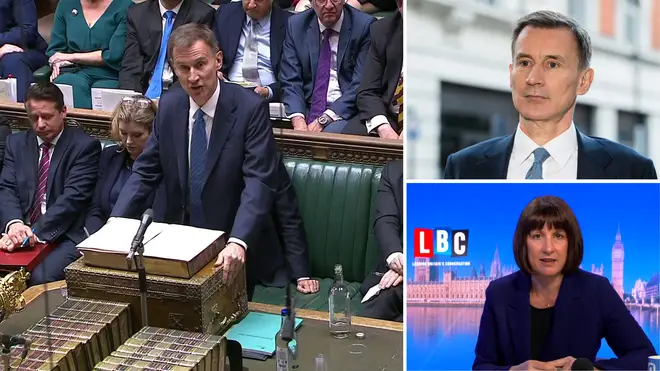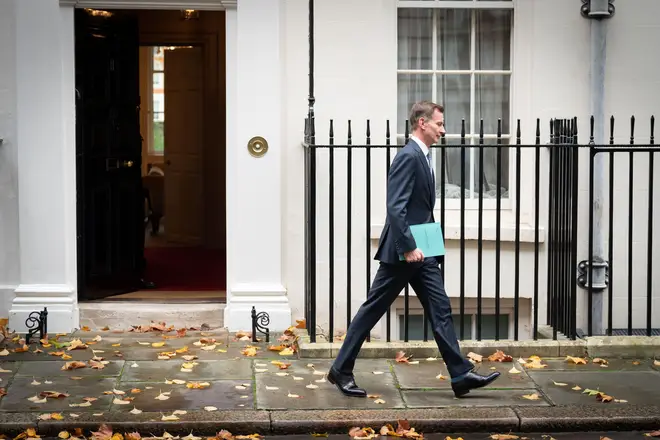
Ian Payne 4am - 7am
23 November 2023, 00:11

The Conservatives have hailed Jeremy Hunt's Autumn Statement, which included the biggest tax cuts since the 1980s.
But Brits have been warned they will still face the biggest tax burden since the Second World War, with Labour accusing the Tories of coming up with their "eleventh growth plan in 13 years".
In yesterday's Autumn Statement, Jeremy Hunt announced that the main 12 percent rate of National Insurance will be cut by two percent from January 6. This will save workers, no average £450 a year.
The national living wage will also see a 9.8 percent increase to £11.44 in April. Pensions, meanwhile, will go up by £924 per year, while benefits will rise by £460, on average, for over five million households next year.

The Tories are hoping that the series of measures announced by the Chancellor - which include the biggest tax cuts since the 1980s - will boost their fortunes at the upcoming General Election.
However, while taxes have been cut, the tax burden on the British people is still forecast to reach its highest level since the Second World War.
The government's decision to freeze tax thresholds between 2022 and 2028 will raise nearly £45 billion, according to the Office for Budget Responsibility, (OBR).
National Insurance cuts: How much more money will you take home each month?
What the Autumn Statement means for you: How tax cuts will boost your wallet
According to their predictions, four million people will be made to pay the 20p basic rate of income tax by 2028, as incomes rise but thresholds remain the same.
Meanwhile, another three millions Brits will fall into the higher 40 percent rate of income tax, while around 400,000 will fall into the top rate of 45 percent.
More people being pushed into the tax system after receiving a pay rise is known as "fiscal drag" and raises tax income for the government.

Iain Dale is joined by Shadow Chancellor Rachel Reeves
This was a point made by Labour's Shadow Chancellor Rachel Reeves, who said Conservative growth had hit a "dead end".
“Taxes on working people have gone up very sharply. in fact, if you add up all the tax increase on personal taxation - income tax and national insurance it’s equivalent to a 10p rise in NI," she said.
"What he did today was a 2p cut, but of course that doesn’t cancel the 10p rise."
If elected into power, the Labour government would keep yesterday's NI cut, and will vote in favour of legislation passing it through, Ms Reeves told LBC.

Jeremy Hunt's key pledges at a glance:
National Insurance: Main 12% rate of NI cut by two percentage points - help 27m people, a saving of over 450 pounds a year from January 6th for the average salary
Living Wage: 9.8% increase to £11.44 an hour from April. Eliminate low pay all together
Pensions: £924 extra a year, up 8.5%
Benefits: Benefit payments will rise by 6.7% - an average increase of £470 for 5.5million households next year
Rent: Housing benefits unfrozen, 1.6m households will get an average of £800m of support next year. Increase allowance to the 30th percentile of local market rents
Self-employed: Major reform of Class 2 National Insurance - flat rate compulsory charge 3.45% a week, paid by self-employed, abolished.Reforms will save around 2m self employed an average of £350-a-year from April
Small businesses: From April 2024, any company bidding for large government contracts must show they pay their invoices within 55 days, reduced to 30 days, to help small businesses.
Business expensing: Full expensing permanent, largest business tax cut in modern British history, Hunt claims
Anti-semitism: Up to £7m to tackle antisemitism in our communities
Tobacco: Hand-rolling tobacco will go up 10%
Booze: Freeze all alcohol duty until August 1 next year. No increase on beer, cider, wine and spirits until 1 August next year.
Public spending: Will be lower than economic growth
Defence: Nato commitment to continue spending 2% of GDP on defence
Skills: £50m over next two years to increase apprentices in engineering and other key growth sectors where there are shortages
Councils: Able to charge higher fees to fast-track planning applications.
Housing: £110m this year and next to deliver high quality nutrient mitigation schemes, unlocking 40,000 homes.A total of 32m to bust planning backlog and deliver thousands homes in Cambridge, London and Leeds.
Pension pots: Legal right to have one pension pot for life instead of having one opened every time you start a new job.
Bills: Up to £1,000 a year off energy bills for a decade if living close to new pylons or substations.
Technology: £4.5bn support to attract investment in green tech for car industry and aerospace.
Levelling Up: Twelve mini Canary Wharfs, as announced in Spring. Extending financial incentives for free ports and investment zones from 5 years to 10.
Jobseekers: Every year we sign off over 100,000 people on to benefits with no requirement to look for work because of sickness and benefits, Hunt says - treatment rather than time off to be made normal with reform to the fit note process.